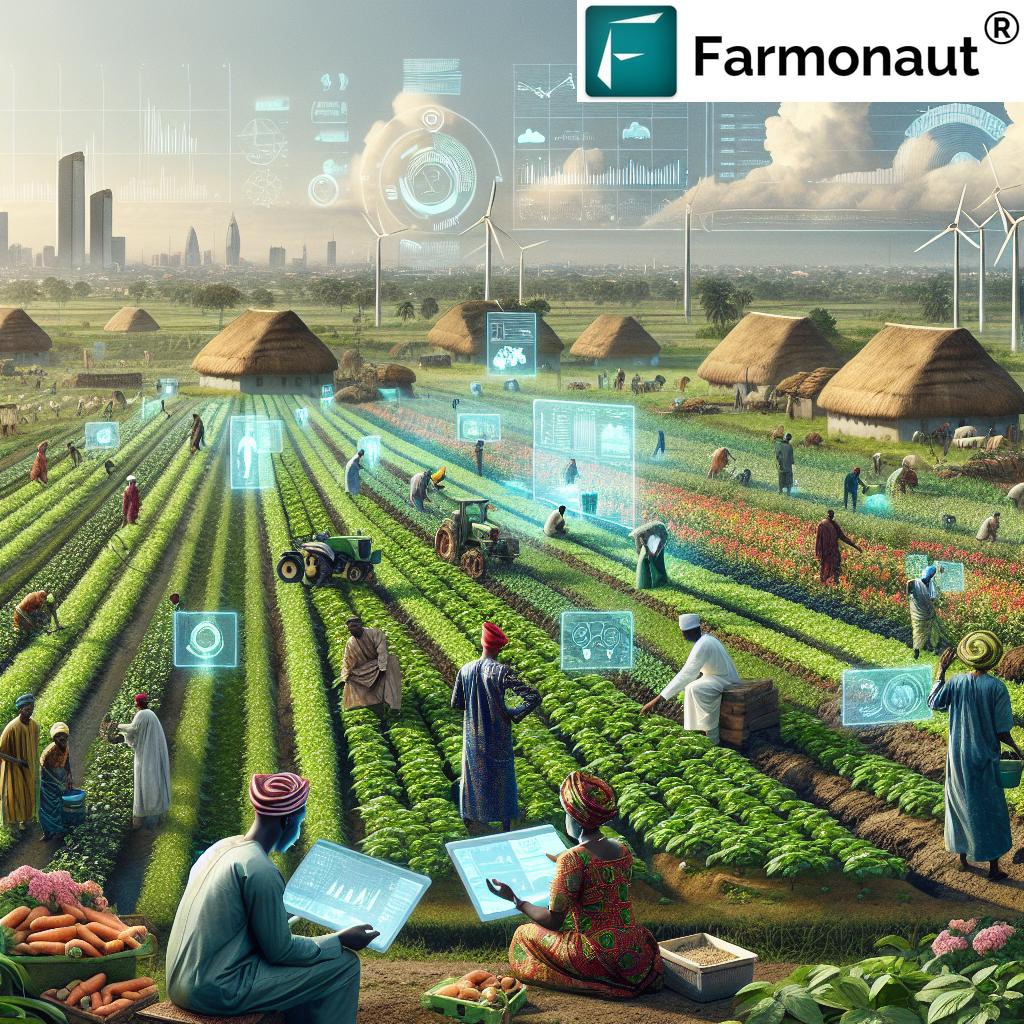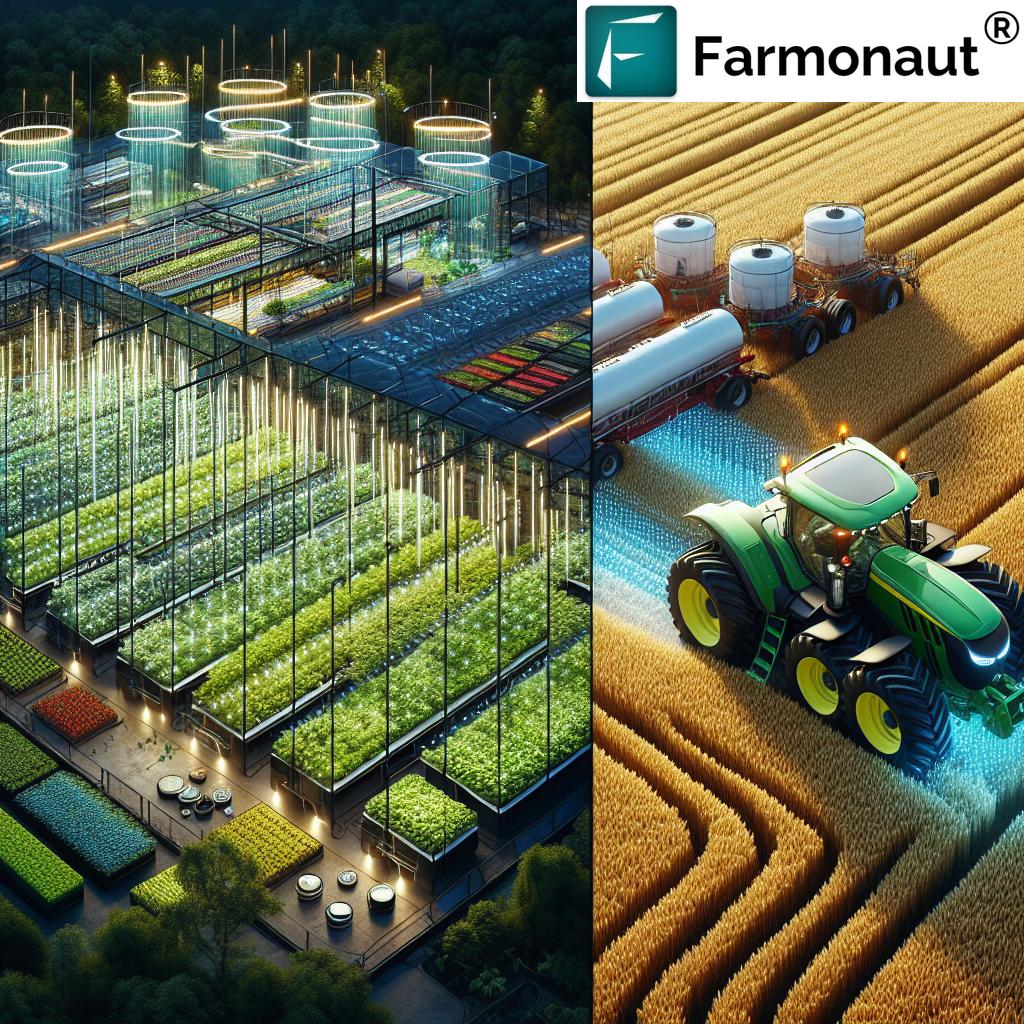Revolutionizing Agriculture: India-Nigeria Partnership Drives Digital Transformation in West African Farming
“India-Nigeria partnership targets digital transformation of 92 million hectares of arable land in Nigeria.”
In a landmark move that promises to reshape the agricultural landscape of West Africa, India and Nigeria have forged a powerful partnership aimed at revolutionizing farming practices through digital transformation and precision agriculture technologies. This collaboration between two of the world’s most populous nations is set to address pressing food security challenges while boosting agricultural productivity and economic growth in both countries.
We, at Farmonaut, are excited to witness this groundbreaking alliance that aligns perfectly with our mission of making precision agriculture affordable and accessible to farmers worldwide. As we delve into the details of this partnership, we’ll explore how it’s poised to drive innovation, sustainability, and prosperity in the agricultural sector.
The Foundation of a Strategic Partnership
The recent visit of Indian Prime Minister Narendra Modi to Nigeria marks a significant milestone in the bilateral relations between these two nations. It’s been 17 years since an Indian prime minister set foot on Nigerian soil, underscoring the renewed focus on enhancing cooperation in key sectors such as defense, trade, energy, and agriculture.
During his meeting with Nigerian President Bola Ahmed Tinubu, Modi emphasized the high priority India places on its strategic partnership with Nigeria. The discussions were described as “very productive,” covering a wide range of areas including technology, health, and most importantly for our focus, agriculture and renewable energy.

Agricultural Technology Partnerships: A Game-Changer for West African Farming
At the heart of this collaboration lies a shared commitment to leverage India’s expertise in agriculture and Nigeria’s vast arable land. This synergy is expected to catalyze a digital revolution in West African farming practices. Let’s explore the key aspects of this agricultural technology partnership:
- Digital Transformation in Farming: India’s prowess in information technology is set to play a crucial role in digitalizing Nigerian agriculture. This includes the implementation of smart farming solutions, data-driven decision-making tools, and IoT (Internet of Things) devices to monitor crop health and optimize resource usage.
- Precision Agriculture Technologies: The partnership aims to introduce cutting-edge precision farming techniques to Nigerian farmers. This involves the use of satellite imagery, drones, and AI-powered analytics to provide accurate insights into soil health, crop conditions, and weather patterns.
- Renewable Energy in Agriculture: Recognizing the importance of sustainable farming practices, both nations are committed to integrating renewable energy solutions in agriculture. This could include solar-powered irrigation systems and bioenergy production from agricultural waste.
As pioneers in satellite-based farm management solutions, we at Farmonaut are thrilled to see the emphasis on precision agriculture and digital transformation. Our platform, which offers real-time crop health monitoring and AI-based advisory systems, aligns perfectly with the goals of this partnership.
Experience the future of farming with Farmonaut’s web app

Affordable Agricultural Solutions: Bridging the Technology Gap
One of the most promising aspects of the India-Nigeria cooperation in agriculture is the focus on developing affordable agricultural solutions. This approach is crucial for ensuring that the benefits of advanced farming technologies reach smallholder farmers who form the backbone of Nigerian agriculture.
Key initiatives in this area include:
- Development of low-cost sensors and monitoring devices
- Creation of mobile apps for easy access to agricultural information and market data
- Establishment of community-based digital knowledge centers
- Introduction of micro-financing schemes for technology adoption
These initiatives resonate strongly with Farmonaut’s mission of democratizing access to precision agriculture. Our cost-effective satellite-based solutions have been designed to cater to farmers of all scales, making advanced agricultural technologies accessible to even the smallest farms.
Sustainable Farming Practices: A Shared Vision
Sustainability is at the core of the India-Nigeria agricultural partnership. Both nations recognize the urgent need to adopt farming practices that not only boost productivity but also preserve the environment for future generations. The collaboration emphasizes:
- Promotion of organic farming techniques
- Implementation of water-efficient irrigation systems
- Development of climate-resilient crop varieties
- Encouragement of agroforestry and intercropping practices
This focus on sustainability aligns perfectly with Farmonaut’s offerings, particularly our carbon footprint tracking feature. By providing real-time data on emissions, we enable agribusinesses to take concrete steps towards environmental compliance and sustainability.
Explore Farmonaut’s API for advanced agricultural insights
“The India-Nigeria agritech collaboration aims to impact over 70% of Nigeria’s 84 million agricultural workforce.”
Agricultural Capacity Building: Empowering the Workforce
A crucial component of the India-Nigeria partnership is the emphasis on capacity building within the agricultural sector. This involves:
- Exchange programs for agricultural scientists and researchers
- Training workshops on advanced farming techniques
- Establishment of agricultural technology incubation centers
- Development of specialized curricula for agricultural education
By focusing on developing local skills and professional expertise, the partnership aims to create a sustainable ecosystem of agricultural innovation in Nigeria. This approach ensures that the benefits of the collaboration extend far beyond the immediate implementation of new technologies.

Agritech Innovation in Developing Countries: A Model for the Global South
The India-Nigeria partnership serves as a shining example of how South-South cooperation can drive agritech innovation in developing countries. This model of collaboration has several key advantages:
- Shared understanding of challenges faced by developing economies
- Transfer of technologies adapted to similar climatic and socio-economic conditions
- Cost-effective solutions tailored to resource-constrained environments
- Mutual learning and co-creation of innovative approaches
As a company committed to making precision agriculture accessible worldwide, Farmonaut sees immense potential in such partnerships to accelerate the adoption of smart farming solutions across the Global South.
Smart Farming Solutions: The Role of Satellite Technology
At the heart of the digital transformation in agriculture lies the power of satellite technology. The India-Nigeria partnership recognizes the game-changing potential of satellite-based farming solutions. Here’s how these technologies are set to revolutionize West African agriculture:
- Crop Monitoring: Satellite imagery provides real-time data on crop health, allowing farmers to identify and address issues promptly.
- Resource Management: Precise information on soil moisture levels and weather patterns enables optimal use of water and other resources.
- Yield Prediction: Advanced algorithms can analyze satellite data to forecast crop yields, aiding in better planning and market strategies.
- Land Use Mapping: Satellite technology helps in accurate mapping of agricultural lands, supporting better land use policies and crop rotation strategies.
Farmonaut’s satellite-based crop health monitoring system is at the forefront of this technological revolution. Our platform provides farmers with valuable insights into vegetation health (NDVI), soil moisture levels, and other critical metrics, empowering them to make informed decisions about irrigation, fertilizer usage, and pest management.
Access Farmonaut’s API Developer Docs for integration
Economic Impact: Boosting Agricultural Productivity and Growth
The India-Nigeria agricultural partnership is expected to have a significant economic impact on both nations. By leveraging India’s technological expertise and Nigeria’s vast agricultural potential, the collaboration aims to:
- Increase crop yields and reduce post-harvest losses
- Enhance the competitiveness of Nigerian agricultural exports
- Create new job opportunities in the agritech sector
- Attract foreign investment in agricultural infrastructure
- Promote value addition and agro-processing industries
This economic boost aligns with Farmonaut’s mission to improve farm productivity and efficiency through data-driven insights. Our AI-powered Jeevn advisory system, for instance, provides personalized recommendations that can significantly enhance crop yields and reduce input costs.
Addressing Food Security Challenges
One of the primary objectives of the India-Nigeria agricultural partnership is to address the pressing food security challenges faced by both nations. By combining efforts, the two countries aim to:
- Increase domestic food production to meet growing population needs
- Improve the nutritional quality of agricultural produce
- Enhance food storage and distribution systems
- Develop early warning systems for potential food crises
- Promote sustainable agricultural practices to ensure long-term food security
Farmonaut’s solutions play a crucial role in supporting these food security initiatives. Our real-time crop monitoring and AI-based advisory systems help farmers optimize their yields, while our blockchain-based traceability solutions ensure transparency and efficiency in agricultural supply chains.
Experience Farmonaut on your mobile device:


Global Impact: Aligning with Sustainable Development Goals
The India-Nigeria agricultural partnership is not just a bilateral agreement; it’s a significant step towards achieving global Sustainable Development Goals (SDGs). This collaboration directly contributes to several SDGs, including:
- SDG 2: Zero Hunger
- SDG 8: Decent Work and Economic Growth
- SDG 9: Industry, Innovation, and Infrastructure
- SDG 13: Climate Action
- SDG 17: Partnerships for the Goals
By promoting sustainable and innovative farming practices, this partnership sets an example for other nations in their pursuit of sustainable development. At Farmonaut, we’re proud to be part of this global movement towards sustainable agriculture, with our solutions directly contributing to these important goals.
India-Nigeria Agricultural Partnership: Key Areas of Collaboration
| Collaboration Area | India’s Contribution | Nigeria’s Contribution |
|---|---|---|
| Digital Transformation | Advanced IT solutions and expertise | Implementation across vast agricultural sector |
| Precision Agriculture | Technology expertise and smart farming solutions | Vast arable land for implementation |
| Renewable Energy | Solar and bioenergy technology | Agricultural waste for bioenergy production |
| Sustainable Farming | Organic farming techniques and water-efficient systems | Diverse ecological zones for testing and adaptation |
| Food Security | Crop improvement research and storage technologies | Large-scale implementation and distribution networks |
| Capacity Building | Training programs and technology transfer | Local workforce and educational institutions |
| Economic Growth | Investment in agro-processing and value addition | Market access and export opportunities |
The Road Ahead: Challenges and Opportunities
While the India-Nigeria agricultural partnership holds immense promise, it’s important to acknowledge the challenges that lie ahead:
- Bridging the digital divide in rural areas
- Ensuring equitable access to new technologies
- Adapting solutions to local contexts and traditional farming practices
- Addressing potential environmental impacts of intensified agriculture
- Navigating regulatory frameworks for technology adoption
However, these challenges also present opportunities for innovation and growth. As a company committed to making precision agriculture accessible, Farmonaut is well-positioned to contribute to overcoming these hurdles. Our scalable and adaptable solutions can play a crucial role in ensuring that the benefits of this partnership reach farmers of all sizes across Nigeria.
Conclusion: A New Era for West African Agriculture
The India-Nigeria partnership in agricultural technology and renewable energy marks the beginning of a new era for West African farming. By combining India’s technological prowess with Nigeria’s agricultural potential, this collaboration is set to drive significant advancements in food security, economic growth, and sustainable development.
As we at Farmonaut continue to innovate and expand our offerings, we’re excited about the potential impact of our solutions in this transformative journey. The future of agriculture in West Africa is bright, and we’re proud to be part of the technological revolution that’s making it possible.
Together, we can build a more sustainable, productive, and prosperous agricultural sector that benefits farmers, consumers, and the planet as a whole.
FAQ Section
Q1: What are the main objectives of the India-Nigeria agricultural partnership?
A1: The main objectives include driving digital transformation in farming, implementing precision agriculture technologies, promoting sustainable farming practices, addressing food security challenges, and fostering economic growth through agricultural innovation.
Q2: How will this partnership benefit Nigerian farmers?
A2: Nigerian farmers will benefit from access to advanced agricultural technologies, training in modern farming techniques, improved crop yields, and better resource management. The partnership also aims to make these technologies affordable and accessible to smallholder farmers.
Q3: What role does renewable energy play in this agricultural collaboration?
A3: Renewable energy is a key focus area, with plans to integrate solar-powered irrigation systems and promote bioenergy production from agricultural waste. This will help reduce dependency on fossil fuels and make farming more sustainable.
Q4: How does this partnership address food security challenges?
A4: The collaboration aims to increase domestic food production, improve crop quality, enhance food storage and distribution systems, and develop early warning systems for potential food crises. These efforts will contribute to long-term food security in both countries.
Q5: What are some of the innovative technologies being introduced through this partnership?
A5: The partnership is introducing technologies such as satellite-based crop monitoring, AI-powered farm advisory systems, IoT devices for precision agriculture, and blockchain-based supply chain traceability solutions.













